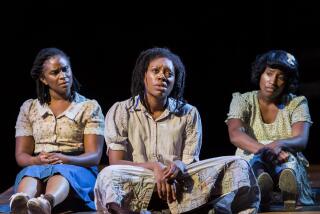Review: From the Archive: Greta Scacchi captivates in Merchant-Ivory-Jhabvala’s 1983 India-set drama ‘Heat and Dust’
- Share via
“Heat and Dust” is being rereleased in a new 4K restoration. This review was originally published Nov. 9, 1983. Kevin Thomas reviewed films for The Times for nearly 50 years.
“Heat and Dust” draws us into a treacherous, precarious world of vanished splendor, that of royal India under British rule during the ’20s.
It was a time when a bejeweled native prince, seated upon a throne and fanned by servants, received the British and their wives while the women in his own family remained in seclusion, peering curiously at the festivities with opera glasses through a bamboo screen. “God Save the King” would then be played on bagpipes by Indians dressed in kilts, to be followed by dinner in a vast hall ablaze with crystal chandeliers.
Understandably, any bride fresh from England might be dazzled by such exotic luxury, but the heroine (Greta Scacchi) of “Heat and Dust” is not the typical colonial wife. She’s pretty, witty and has a streak of recklessness. Her blandly handsome husband (Christopher Cazenove), a rising civil servant in the small state of Satipur, suspects he loves her because she’s not “one of us.” What neither suspects is that she will end up, in the words of a friend, “outraging two sets of conventions” — Indian as well as British.
For 21 years, the team of director James Ivory, producer Ismail Merchant and writer Ruth Prawer Jhabvala have collaborated on a series of subtle and intimate films, most of which have dealt with individuals adrift in an alien country. Usually, that country is India, where Merchant was born and where his partners have spent much of their lives. Like such Merchant-Ivory-Jhabvala predecessors as “Shakespeare Wallah” and “Bombay Talkie,” “Heat and Dust,” based on a novel by Jhabvala, is the work of people who know their territory thoroughly.
“Heat and Dust” casts its spell upon the viewer just as India does upon Scacchi. The pacing is appropriately leisurely as Scacchi gets caught up in the boredom and torpor of her rigid colonial existence. Tiring of constantly being told what is expected of a British civil servant’s wife, she finds herself gradually drawn to Satipur’s handsome prince (Shashi Kapoor), who is as corrupt as she is naive.
Not content with telling just Scacchi’s story, the filmmakers have framed it with a present-day inquiry by Scacchi’s grandniece (Julie Christie), who has come to India to find out all she can about her scandalously romantic relative. Cutting back and forth between past and present often proves distracting, however. Christie’s inquiry extends the film’s feminist sentiments by contrasting the liberated Christie with her aunt, who may have been even more oppressed than her Indian counterparts, condemned by the tradition of purdah to a life of seclusion yet capable of wielding considerable power from behind the scenes.
The trouble is that the framing device weighs down the film needlessly. Both the feminist and cross-cultural implications of Scacchi’s fate need no further spelling out, and there’s not enough time for Christie’s story to seem anything but contrivance.
Despite the sketchiness of Christie’s role, she is a radiant presence. Milan-born but raised and educated in England and Australia, newcomer Scacchi is captivating in her portrayal of a woman easily described as headstrong and foolish yet possessed in full measure of the courage of her convictions. Long a star in India, Kapoor is perfect as the prince, a man of boundless childlike charm disguising an equally infinite capacity for evil. Cazenove suggests a man as decent as he is limited.
Nickolas Grace, playing a character much like that of James Mason in Ivory’s “The Autobiography of a Princess,” provides the connecting link between the British and the Indians. He’s an intelligent man who has allowed himself to become the court jester to Kapoor. Madhur Jaffrey, the princess in “The Autobiography of a Princess,” plays Kapoor’s possessive mother, a woman of hauteur and cunning. Charles McCaughan, an acquaintance of Christie’s, is a strung-out American hippie trying to become a holy man. As he reluctantly departs for home, he describes with irony the all-American “everything matches” bathroom that awaits him in Iowa.
While “Heat and Dust” attempts too much, it is rewarding for the patient in its unique Merchant-Ivory-Jhabvala sensibility. They appreciate the grandeur that was imperial India while at the same time laying bare its evils, both colonial and native. As a result, “Heat and Dust” is charged with ambivalence. Cinematographer Walter Lassally captures in revealing, amusing observations the essence of the film’s title.
-------------
‘Heat and Dust’ (1983)
Rated: R
Running time: 2 hours, 13 minutes
Playing: Laemmle Royal, West L.A.; Laemmle Town Center, Encino; Laemmle Playhouse 7, Pasadena
See the most-read stories in Entertainment this hour »
Movie Trailers
More to Read
Only good movies
Get the Indie Focus newsletter, Mark Olsen's weekly guide to the world of cinema.
You may occasionally receive promotional content from the Los Angeles Times.










